Educational Resources
These resources can be used by groups or as individuals, in a public or private setting. Although some of them may be marketed for children, they are opportunities for continued education for all ages. Michigan Audubon will continue adding to this page to provide more materials to help initiate environmental education and involvement of youth in the state.
Everyone likes birds. What wild creature is more accessible to our eyes and ears, as close to us and everyone in the world, as universal as a bird?
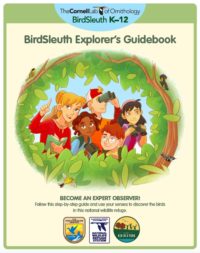
BirdSleuth K-12
birds.cornell.edu/k12
This K-12 program by the Cornell Lab of Ornithology, offers various educational tools to help students build science skills, and connect with local habitat and biodiversity. Additionally, the program offers experience with citizen science projects. BirdSleuth is a great way to engage students in science utilizing birds and birding. Resources include downloadable lessons, activities and activity kits, workshops, and online webinars, which can also be found on their Youtube channel. Although these activities may seem to be set up for teachers to lead a class, they can also be utilized in informal sessions or homeschool groups. Some items have a nominal cost, but many are free.

Science & Nature Activities for Cooped Up Kids
birds.cornell.edu/k12/science-nature-activities-for-cooped-up-kids
The folks at Cornelle Lab of Ornithology have created some lessons for kids home from school. Each week they focus on a new topic and create materials for three different age groups: K-2, 3-5, and 6-8 grade students. In addition to activities both independent and guided, a list of family quests is given for the week to help support the week’s topic. Activities include both indoor and outdoor portions that can be completed as able.
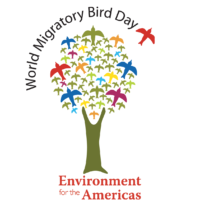
Environment for the Americas
environmentamericas.org
This site offers educational features for World Migratory Bird Day, migratorybirdday.org. including infographics, activities, and PowerPoints. All new resources are tailored to coincide with the unique theme chosen for the current year. Past years’ work is also available on the site for use. You can utilize these tools to hold your own World Migratory Bird Day celebration or for a classroom lesson, community presentation, or informal educational event. Resources could also be used for homeschool students or by parents or grandparents at home.

NestWatch
nestwatch.org
NestWatch is a nationwide monitoring program designed to track status and trends in the reproductive biology of birds, including when nesting occurs, number of eggs laid, how many eggs hatch, and how many hatchlings survive. Participating in NestWatch is easy and just about anyone can do it, although children should always be accompanied by an adult when observing bird nests.
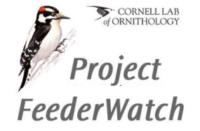
Project FeederWatch
feederwatch.org
FeederWatch is a winter-long (November-April) survey of birds that visit feeders at backyards, nature centers, community areas, and other locales in North America. Participants periodically count the birds they see at their feeders and send their counts to Project FeederWatch. People of all skill levels and backgrounds, including children, families, individuals, classrooms, retired persons, youth groups, nature centers, and bird clubs. You can count birds as often as every week, or as infrequently as you like: the schedule is completely flexible. All you need is a bird feeder, bird bath, or plantings that attract birds.

eBird
ebird.org
This endless resource allows you to explore birds and hotspots near and far, all based on the latest sightings from around the world. By entering sightings, you can contribute to one of the largest avian data sets and while keeping an archive of everything you see through this community science platform.

All About Birds
allaboutbirds.org
Use Cornell Lab’s All About Birds website to identify birds, learn about the life history, listen to the sounds, and watch bird behavior on video. The guide is arguably the most comprehensive collection of North American birds available online.
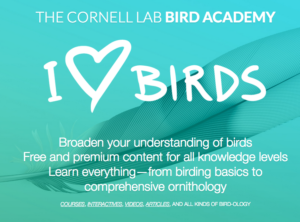
Bird Academy
Bird Academy is part of All About Birds and offers a variety of learning opportunities for people of all ages. Bird Academy resources include free and paid classes, including an eBird Essentials course to learn the basics of eBird. There are also open lectures with recordings, a video library that covers several bird topics, and learning games that include quizzes puzzles and interactive tutorials.
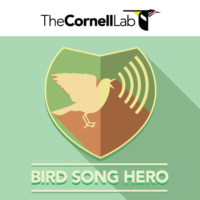
Bird Song Hero
academy.allaboutbirds.org/bird-song-hero
Are you looking for help with identifying bird songs and calls? Bird Song Hero, offered by the Cornell Lab of Ornithology, teaches just that with a game that has players matching bird calls with the corresponding spectrogram. The game helps you to visualize the bird calls, which in turn helps commit them to memory. Being a bird song hero is fun for participants of all ages.
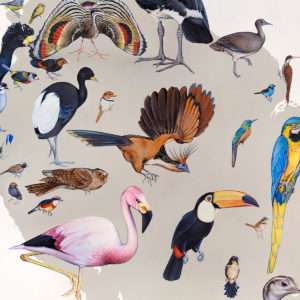
The Wall of Birds
academy.allaboutbirds.org/features/wallofbirds
This large mural on the wall of the Cornell Lab of Ornithology visitor center has a new online interactive feature. The mural features 270 species from all surviving bird families accompanied by some extinct ancestors. Each of these species has clickable information, including the extinct species pictured.
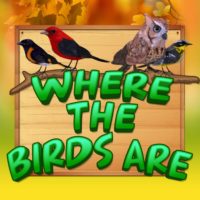
Where the Birds Are
wherethebirdsare.com
When the weather keeps you inside, Where the Birds Are allows you to virtually step outside. This game has children identify the bird species, and sometimes gender, of birds found in common habitats by using real data from birding hotspots around the country to simulate a real bird watching experience. Birds are recorded on a check list and identification success rate is tracked as participants work through their game. This website gives students an opportunity to experience bird watching and work on their identification skills from their classroom or home.
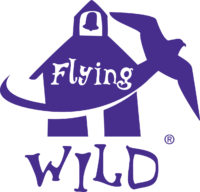
Project WILD — Flying Wild
fishwildlife.org/projectwild/flying-wild
Project WILD’s mission is to help students learn how to think, not what to think, about wildlife and the environment, and is presented by the Association of Fish & Wildlife Agencies. Their Flying Wild project offers practical hands-on classroom and outdoor field investigation experiences connecting real-world experiences in bird biology, conservation, and natural history.
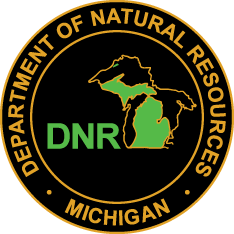
Michigan DNR Natural and Historical Education for Home
Michigan DNR has put together a variety of resources for school-aged children. Among these resources are videos, virtual field trips, nature exploration activities, lessons, and reading materials.
Activities for download
The following activities have been created using a variety of resources and experiences, including information available on some of the above websites. You are welcome to download and use them as needed.
Bird Olympics: Birds have many different adaptations that make them well suited to live in their specific habitat. These adaptations may be physical, like size or beak shape, or they may be behavioral, like communication and nesting strategy. This activity helps children compare themselves to some bird champions. Using the directions and station information, children can compare their own skills with that of the birds and record them on their datasheets.
Habitat Bingo: Habitat consists of food, water, shelter/cover, and space. What better way to learn about bird habitat than on a habitat bingo walk. Using these bingo cards, take children on a nature walk to find some of the many components of good bird habitat.
Please contact Manager of Education and Events Lindsay Cain with questions at lcain@michiganaudubon.org or 517-580-7364.
